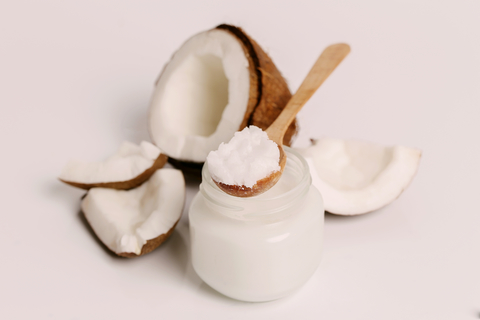Coconut oil is the new food craze that is sweeping the nation and it has sparked endless debates in the health and nutrition community. Some claims state that coconut oil can be helpful for weight loss, especially burning fat. However, some health professionals are denouncing it as a counterproductive weight loss tool. Still, it’s becoming a more and more common practice to do things like adding a tablespoon of the stuff to your coffee every morning. So what do these people know that we don’t?
The main hot topic regarding coconut oil is its content of medium-chain triglycerides. Let’s break it down. There are three different types of fatty acids: Short, medium and long-chain. The most common types of fats found in foods are long-chain fatty acids, or triglycerides, which go through a lengthy and complicated process of digestion due to their longer chemical structure. This increases the possibility of the fat being stored as fat tissue when the body is in a calorie surplus. Coconut oil, however, is rich in medium-chain triglycerides or MCTs, which are easily broken down by the liver and more easily absorbed. Therefore, since MCTs are less likely to be stored as fat due to their rapid absorption, it’s been credited at a “better” source of fat that some studies say can even supercharge your metabolism.
But here’s the catch: Studies have indeed found that subjects who ate medium-chain triglycerides burned more fat. However, these studies had subjects eating MCTs that were 8 and 10 carbons long in chemical structure. The thing is, these types of fats only make up 15% of the MCTs in coconut oil and were isolated just for the study. The other 85% of fats are 12 carbons long and there is no present research that says those have the same effect on your metabolism. Basically, the purported “fat burning” type of fat these studies are promoting is only naturally present in coconut oil in small amounts. Therefore, you’d have to eat a whole heck of a lot (and likely gain a good amount of weight in the process) to get the same benefits. The good news is, consuming medium-chain triglycerides in place of long-chain triglycerides MAY be beneficial, but the research isn’t concrete enough to call coconut oil a tool for weight loss.
The bottom line: Coconut oil can be a part of your healthy fat repertoire due the beneficial effects of MCTs. Therefore, we should also consider other good sources of fats, such as olive oil as a source of monounsaturated fats and canola oil as a source of omega-3s. It is true that eating these fats in moderate amounts can help us lose fat, but please remember: One tablespoon of any type of fat delivers about 120 calories. To lose weight, you must to be mindful of caloric intake, regardless of the source.






